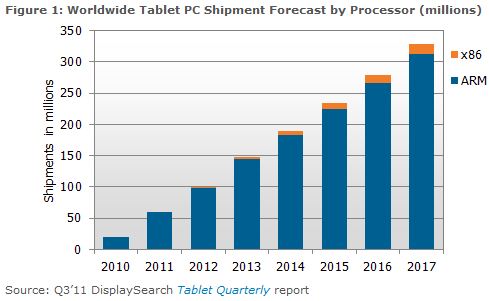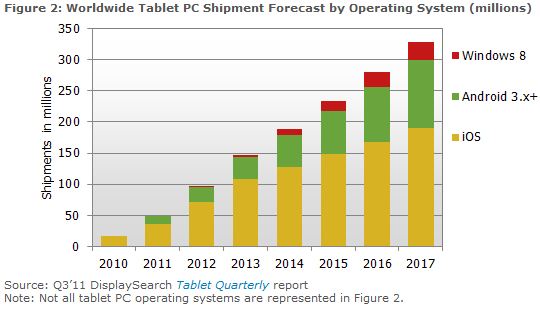
But you knew that already, right?
Today, DisplaySearch issued the most unusual of tablet forecasts -- one that looks at the totality of the market and takes Windows into consideration. Gartner and IDC use a separate "media tablet" category for Android tablets and iPad, based on the operating system, choosing to classify "Tablet PCs" running Windows as personal computers. DisplaySearch has more sensibly made the designation around processors -- ARM and x86 -- which better defines the market for the future, and isn't the future what a forecast is all about?
Still, while perhaps practical, the designation ignores fundamental aspects of the tablet market, such as: Consumers don't care about tablet microprocessors. "Unlike notebook and netbook PCs, where consumers have chosen products based on the processor or PC vendor, consumers of new mobile devices care more about what they can do with the devices, which is associated more with the device applications and services", says Jim McGregor, chief technology strategist for In-Stat, a sister organization to DisplaySearch (both analyst firms are part of NPD group).
Yeah, but hasn't "what they can do with the devices" always been the case? No platform succeeds without applications, whether they're programs running on it or things you do with it -- the task. The killer application (or use) for toasters is, well, browning bread. I'm making a designation between applications and application (what you apply) but functionally they're the same -- the platform or device has purpose meaningful to you.
What's most surprising from DisplaySearch's forecast is how dramatically it differs from Gartner's, even while adding x86 Tablet PCs into the mix. Gartner predicts that media tablet sales will reach 900 million by 2016, up from 20 million last year. DisplaySearch sees the number only reaching 330 million by 2017 -- a stunning two-thirds less. The NPD company sees the number growing from a projected 59.9 million this year.
Is Gartner being overly bullish or DisplaySearch overly conservative -- or neither? The analyst firm is called DisplaySearch for a reason -- using in part relationships with display manufacturers in Asia as major component of its forecasts. If DisplaySearch is right, Gartner and many other analyst firms are grossly over-estimating how many tablets will be sold within the next half-decade.

Even 330 million is a huge number and represents significant cannibalization of the PC market. Gartner projects PC shipments of more than 360 million this year. While one doesn't have to replace the other, DisplaySearch sees eventual displacement as features converge.
"The tablet PC and notebook PC markets are on a collision course as both product categories continue to evolve and improve on their respective weaknesses" Richard Shim, DisplaySearch senior analyst, says. "As such, each product category will influence the other over time. Still, the incumbent platforms have inherent advantages in the early years".

Some of that collision is occurring now, as consumers buy tablets, primarily market-leading iPad, instead of new PCs. For some people, the media tablet replaces the personal computer, for others it augments functionality enough to displace new purchase. Windows 8 dramatically changes the dynamics. The operating system will support ARM as well as x86 processors, opening up new categories of devices -- and they will be more like laptops available today. DisplaySearch sees Windows 8 Tablet PCs picking up momentum starting in 2013.
Still, Android and iOS will capitalize on a larger market -- one IDC forecasts will reach 1 billion unit shipments by 2015: smartphones. McGregor explains: "Although several processor architectures could be used to power tablet SoCs, the rich software ecosystem of the ARM architecture built around smart phones is proving to be a key differentiating factor".
Cellular data will increasingly be important to tablets, according to DisplaySearch, rise from 10 percent of units in 2013 to one-quarter in 2017.
Photo Credit: Wolfgang Kruck/Shutterstock

